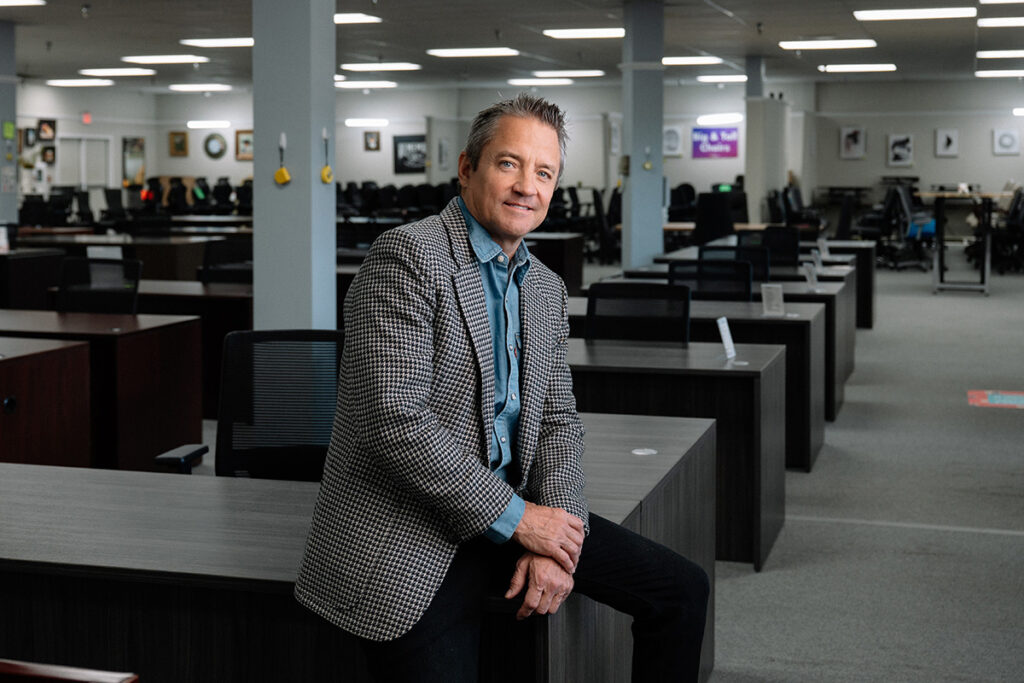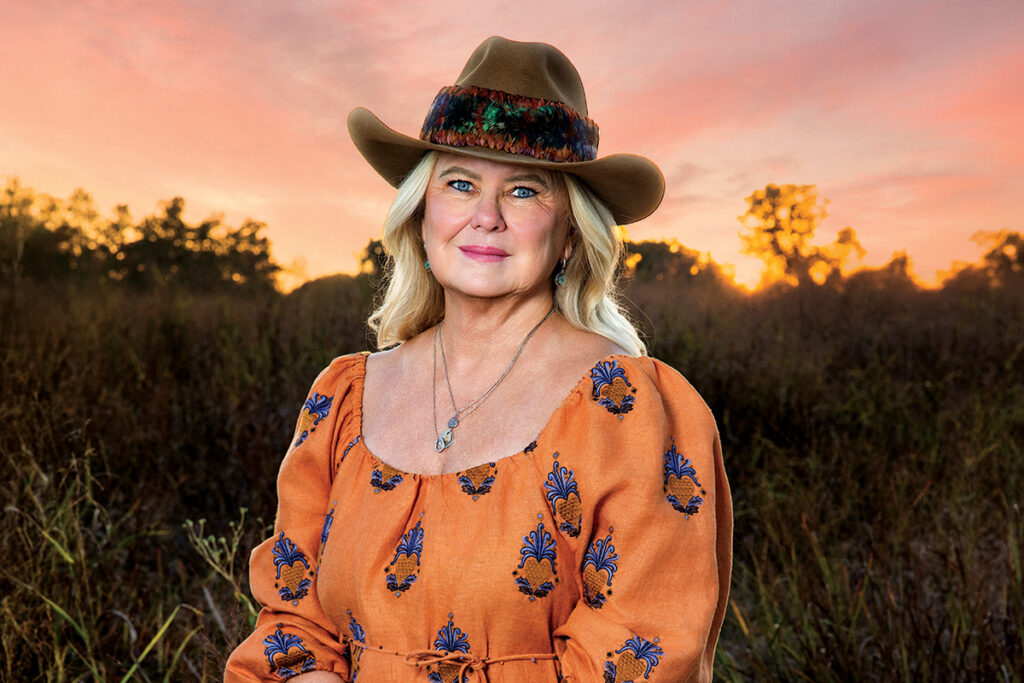Persevering during a Pandemic:
Stories from some of H-E-B’s female leaders
By Bonny Osterhage
Other states have grocery stores, but Texas has H-E-B. What’s the difference? Plenty! More than just a place to buy milk, bread, and cheese, H-E-B is a company built on a culture of putting people first. That includes everyone from the employees (called Partners) to the customers to the community at large. Known for going above and beyond in times of need, the grocery giant has been on the front lines providing emergency relief throughout Texas whenever and wherever it’s needed. From delivering tanks of water to Beaumont in the aftermath of Hurricane Harvey to providing meals to storm victims in Dallas after tornados ravaged parts of the city, it seems there is nothing that H-E-B can’t handle, including a global pandemic. While the rest of the country appeared to panic, the company did what it does best—it took care of its customers with a level of preparedness that looked effortless but resulted from around-the-clock planning and execution. The following women were constantly assessing and reassessing information that seemed to change hourly and putting practices in place to take care of the company’s Partners so that the Partners could take care of business confidently, efficiently, and most of all, safely.

“We’ve always been people first, and now we had to take care of people in a situation where we were initially unsure of the best course of action,” says Chief People Officer Tina James. “Trying to figure out the right thing to do and how to care for our Partners with conflicting or very little information was challenging, but our commitment to their safety and health never waivered. It wasn’t a question of, ‘Would we keep them safe,’ it was a question of, ‘How would we keep them safe?'”
Safety First
One of the first steps was to enlist the help of the medical board that oversees the H-E-B operated Magenta Health Clinics. Made up of three local physicians, the board, along with Chief Medical Officer Dr. Marty Makary, served as a source of guidance on all safety precautions, including where and how to provide COVID-19 testing, as well as mask and distancing protocols.

“We had a ton of clinical expertise that worked closely with HR to help us determine policies,” says Brooke Brownlow, Group Vice President of Total Rewards. “We put our doctors on videos to tell our Partners what to do, and we texted out short video links to disseminate information as it became available.”
CAMS (Covid Action Managers) were appointed and put in place at every retail store, manufacturing facility, and warehouse to serve as font line execution bodies, ready to make things happen as circumstances changed daily and sometimes hourly. These Partners were trained on the latest protocols and up-to-date information and then deployed to pass that information and training to the Partners at the sites.

“Our customers expect us to solve problems, but we realized very quickly that we couldn’t solve this,” says Christy Banazek, Vice President of HR Food and Drug. “We had to switch gears and get comfortable with putting information and communication out that we knew would change. It was a struggle for us because we are all problem solvers, and to go home at night and know you didn’t solve the problem was hard. We had to get to the point where we accepted that we were doing the best we could with the information we had and that it was all in the best interest of our Partners.”
That included a level of transparency that James agreed wasn’t always easy.
“We let everyone from Partners to customers know immediately if we had any confirmed cases at a location,” she says. “We took a lot of heat for that early on and put ourselves in the spotlight, but our brand is built on trust and credibility, and if we are going to remain true to our values, we have to maintain that.”
Stepping It Up
More than just implementing face masks, social distancing signage, and partitions at the registers for cashiers, the team had to consider other measures, including changing store hours, closing some departments, and ramping up the staffing. Seventy-four hundred temporary Partners were hired to prepare for the surge in business. Of those 7400, approximately 4000 were sent to help with H-E-B Curbside, a relatively new service that suddenly found itself front and center with more business than it was prepared to handle.

“Curbside went from being a convenience to becoming a necessity, and we were not prepared for that,” says Esther Castelo, Vice President of E-commerce, Curbside, and Delivery. To meet the demand, the team got creative in-store, finding new space to service more customers, but there was still the issue of safety.
“Partners in Curbside work very closely together,” explains Castelo. “We had to create a safe environment where the Partners felt confident enough to come to work.”
In addition to the existing precautions, contactless pickup and delivery were implemented, and departments were spread out to minimize contact between Partners. The number of Partners in the Curbside and Delivery departments increased from 8000-12000.
“Pre-COVID, we were focused on trying to grow that side of our business,” says Castelo. “When COVID hit, we advanced it by almost three years.”
The Whole Partner
Castelo’s wasn’t the only department that suddenly found itself on the fast track. The entire company was working at warp speed to find solutions to never before experienced problems.
“Out of necessity, we have gotten more done over the last 6-7 months than ever before,” says Banazek. “Things that would have taken us a couple of years to do otherwise have been pushed through fast.”
“None of us unplugged from March 4 until July 4,” adds James. “We had no days off.”
The team realized that they couldn’t sustain that pace and that to take care of Partners and customers, they had to start taking care of themselves and each other.

“We went into it like a sprint and quickly realized that it was an ultramarathon,” describes Mayerland Harris, Vice President HR Talent Development. “We quickly realized that we couldn’t continue to work at that pace and that we needed to take care of one another in order to take care of our Partners and our culture.”
That meant taking the time to build each other up, listen to each other vent, and take over each other’s calls and e-mails.
“We supported one another in a way that we had not done previously, although we had all worked together for years,” Harris adds.
It also meant making time for fun. A Zoom Halloween party, team happy hours, coffee chats on weekends, themed Zoom meetings, and virtual treasure hunts were just a few of the ways that Partners were urged to stay connected and find ways to enjoy the “people first” company culture for which H-E-B is known.
“We gave Partners H-E-B socks, and it became such a big thing,” laughs James. “Partners were showing us their socks at every Zoom meeting.”
Finally, it meant giving everyone grace as teams worked together to navigate uncharted territory, including working from home.

“No two situations were alike,” says Tammi Fredrick, Director of Quality Assurance, adding that some Partners found themselves trying to work from home while homeschooling young children. “We had to give our Partners permission to figure out their work/life balance. The hours they worked might look different, but they were still getting it done, and we all had to be okay with that.”
Looking Ahead
As the saying goes, “every cloud has a silver lining.” With the worst days hopefully behind them, this dynamic group of female leaders has begun to reflect on what they have learned and what pandemic pivots might become part of the permanent H-E-B culture. Like so many people during the past year, they have begun to understand the value of downtime and a more flexible pace.
“I think we’ve all become more aware of our mental health and what we need to process information effectively,” says Harris. “I will no longer schedule back-to-back meetings because I’ve realized that I need a mental break, and I can get as much done in a 45-minute meeting as I can in a 60-minute meeting.”
Working from home might also become a viable option for some employees going forward.
“We’ve learned that people can do their jobs anywhere,” says Castelo. “Sometimes, they are more productive when they are working from their dining table or patio.”
As a whole, the women all agree that the company has emerged stronger and better than ever and that the values that H-E-B was built on withstood the ultimate test.
“We created a two-way dialogue really for the first time with our Partners, and we got good feedback and created a bond with our Partners that is stronger than before,” Banazek says. ” Our company is more informed than it has ever been, and our Partners are hearing from our leaders more often on issues that matter to them.”
“We have always been about having trust, heart, passion, and making a difference in people’s lives,” concludes James. “We just did it at a higher level. We brought up who we already were.”






